When Christian Aid took a pop at Tesco earlier this month for failing to take into account carbon emissions incurred by its suppliers, it highlighted a very real dilemma for retailers.
While they're the ones that have been generating all the headlines for their green pledges, it's the suppliers who are key to realising those goals and the pressure is now mounting on them to keep pace with the retailers.
Not that they were standing idly by. Many are quick to point out that are driving their own green agendas and argue that the raft of recent initiatives (see above) has little to do with retail pressure and far more to do with cutting costs and improving service levels.
Suppliers had already woken up to environmental issues way before the retailers started turning the screw, agrees Mark Barthel, special advisor at Waste & Resources Action Programme. He highlights the fact that 12 of the UK's biggest manufacturers have signed up to the government-backed Courtauld Commitment - including Nestlé, Heinz, Mars UK and Dairy Crest.
"Suppliers are doing a lot of things to be greener," says Barthel. "Cadbury Schweppes' Purple Goes Green initiative and Nestlé's new sustainability strategy are prime examples, as are the moves to reduce packaging by many companies such as Heinz, Coors and Coca-Cola."
According to Barthel, suppliers such as Coors, which switched its Grolsch bottles from 220g to 190g to cut packaging and energy use, do so for sound economic as well as ethical reasons.
"Many companies have made changes because it makes financial sense," he says. " If you change a packaging film from 35 microns to 30 microns, you can use the same machinery but the costs saving is obvious."
McCain is one of the many to have proactively taken steps to reduce their environmental impact. Last month it claimed it would be the first major UK food manufacturer to power a factory using wind turbines, reducing its energy costs by up to 60% a year.
Coca-Cola Enterprises has also been ringing the changes both for its own ends and to meet retail demands. So, on the one hand, it is reducing the weight of its 500ml bottles from 26g to 24g, introducing more energy-efficient refrigeration units and reducing the weight of its glass bottles. But, on the other hand, it is also working hard to meet retailer requests for more recycled material in its PET bottles.
There's plenty of help available to those wanting to go green. Logistics company Wincanton has launched a scheme that encourages retailers and suppliers to collaborate over deliveries to cut food miles, for instance. So rather than suppliers making separate deliveries to the retailers, sometimes in half loads, manufacturer orders are consolidated and delivered in full vehicle loads, reducing carbon emissions.
All three parties are driving the initiative, says Chris Taylor, business director for manufacturing at Wincanton. The bottom line is crucial. "Manufacturers understand it is the way they can improve their service levels and be more competitive."
However, there's little doubt that suppliers are coming under more pressure from the retailers and the issue they're coming under pressure over is carbon footprints. While many businesses have already pledged to become carbon-neutral, the emphasis is now switching to reducing emissions rather than offsetting them, says Michelle Thomas, partner at law firm Eversheds. A major reason for this is that carbon emission reduction credits, which companies can buy to meet their own emissions targets, will become more difficult to purchase.
"If a company is going to produce more carbon it will have to buy carbon credits to offset its use," she says, "but the whole issue of becoming carbon-neutral and buying carbon credits is that it's going to become more expensive. Because of this we are going to see less carbon offsetting and more emphasis on energy saving."
As Christian Aid made clear, Tesco will be judged not only on its own carbon emissions but those of its suppliers. And they will want evidence that their suppliers are raising their games. "Retailers will start putting pressure on manufacturers ," she says. "It is up to suppliers to deliver solutions. It is only a matter of time before retailers say to their suppliers that they want them to reduce carbon emissions and want to see processes in place to do this."
Proof of progress is essential, adds a CCE spokesman, because it helps to manage retailer expectations. "Expectations are high from retailers, but if you take our packaging, there is very little more that can be done to cut the weight of our aluminium cans or bottles further."
Retailers have already demanded suppliers do more to cut packaging and waste. "There is pressure because the retailers have made their targets public," says Barthel, adding that the real driver is not the retailer but the consumer. "Consumers are asking retailers for less packaging and the retailers are then talking to the supply chain."
His views are echoed by Sir Terry Leahy, Tesco chief executive. " The best way to achieve change is recognising the signals from consumers that they don't want a certain product, they want a low-carbon alternative," he says. "It's about the economics of choice. The signals go back to the manufacturers and the supply chain responds."
One of the big questions now is whether the likes of Tesco will start choosing suppliers based on their green credentials. Sir Terry says it's in the best interest of suppliers to go green. "I think greener companies will grow," he reasons. "There will be no coercion, but co-operation."
Retailers must be realistic, however, warns Barthel. "Suppliers are in a difficult position if each retailer makes different demands," he says. "Retailers are beginning to acknowledge that they share suppliers, so must collaborate. If they impose too many demands on manufacturers it will just lead to inertia."
Alpro
The soya manufacturer has set itself a target of becoming carbon-neutral by 2020 after it became one of the first suppliers in the UK to make the green pledge back in May. It is currently calculating its carbon emissions "from field to shelf" and plans to have the results by the end of the first quarter of next year. Among its plans is producing biogas from its water purification plant in Belgium, using waterways to transport unfinished products, looking at reducing packaging, introducing recycling projects and cutting carbon emissions from its plants. Alpro has also launched a campaign to encourage its customers to lobby councils to increase recycling facilities for Tetra Pak cartons.
Coca-Cola Enterprises
The company has conducted trials into the feasibility of reducing the weight of its Coca-Cola, Diet Coke, Coke Zero, Fanta, Sprite and Lilt bottles from 26g to 24g - a saving of 8%. The new bottling process is being rolled out across its Sidcup site from this month and will be introduced to its Wakefield site next year, when it will produce annual savings of 1,400 tonnes of PET. The company is also linking up with 13 Football League clubs for a recycling drive called Talent from Trash.
Calon Wen
The Carmarthenshire organic dairy co-operative supplies milk in polythene bags that can be transferred to reusable jugs. The company says if all plastic milk bottles were replaced by the new packs it could reduce the amount of plastic used by nearly 100,000 tonnes each year.
Nestlé
Nestlé has reduced water usage at its Kit Kat-producing York factory by 51,000 cubic metres over the past five years and says that by 2010 it wants to have reduced emissions per tonne of finished product by 13% on 2001 levels. This Easter it reduced the size of its small egg cartons by 30% and the cartons are also made from 80% recycled cardboard. The company plans to make further reductions in 2008 and has pledged to deliver absolute reductions in packaging waste by 2010.
Procter & Gamble
P&G has launched its own eco-mark, called Future Friendly, which encourages shoppers to do their bit for the environment. The company has also reduced packaging by 27% since 1990 and has introduced concentrated products that use 70% less packaging and reduce the amount of fuel used in transportation.
Heinz
The baked beans maker has reduced the amount of material used in its cans at its Kitt Green factory in Lancashire, Europe's largest food processing site with an output of more than one billion cans a year. The new can end is 0.18mm thick, a reduction of 10%, which has generated annual savings of £404,000 and 1,400 tonnes of steel.
Cadbury Schweppes
Its Purple Goes Green initiative has set a target to shrink its environmental footprint by 2020 by halving its energy use, cutting standard packaging 10% and seasonal and gift packaging 25%. It has joined the Carbon Trust's pilot scheme and will calculate the footprint of selected products.
My Smoothie
The company claims its cartons are the only liquid food packaging type made mostly from a renewable source. The raw material comes from sustainable Swedish forests, where two new trees are planted for every one harvested.
Innocent Drinks
The drink brand is displaying the carbon label for all its smoothie recipes on its website and has pledged to reduce further the amount of PET it uses. It is also conducting energy audits with its manufacturing partners.
PepsiCo
The first company to introduce the Carbon Trust's carbon footprint labelling on to a food and drink product in April this year, PepsiCo is now rolling the label out across its entire range of Walkers crisps. The company also recently switched to sourcing all its potatoes from Britain, therefore reducing its food miles.The highest on-shore wind turbines in the UK
While they're the ones that have been generating all the headlines for their green pledges, it's the suppliers who are key to realising those goals and the pressure is now mounting on them to keep pace with the retailers.
Not that they were standing idly by. Many are quick to point out that are driving their own green agendas and argue that the raft of recent initiatives (see above) has little to do with retail pressure and far more to do with cutting costs and improving service levels.
Suppliers had already woken up to environmental issues way before the retailers started turning the screw, agrees Mark Barthel, special advisor at Waste & Resources Action Programme. He highlights the fact that 12 of the UK's biggest manufacturers have signed up to the government-backed Courtauld Commitment - including Nestlé, Heinz, Mars UK and Dairy Crest.
"Suppliers are doing a lot of things to be greener," says Barthel. "Cadbury Schweppes' Purple Goes Green initiative and Nestlé's new sustainability strategy are prime examples, as are the moves to reduce packaging by many companies such as Heinz, Coors and Coca-Cola."
According to Barthel, suppliers such as Coors, which switched its Grolsch bottles from 220g to 190g to cut packaging and energy use, do so for sound economic as well as ethical reasons.
"Many companies have made changes because it makes financial sense," he says. " If you change a packaging film from 35 microns to 30 microns, you can use the same machinery but the costs saving is obvious."
McCain is one of the many to have proactively taken steps to reduce their environmental impact. Last month it claimed it would be the first major UK food manufacturer to power a factory using wind turbines, reducing its energy costs by up to 60% a year.
Coca-Cola Enterprises has also been ringing the changes both for its own ends and to meet retail demands. So, on the one hand, it is reducing the weight of its 500ml bottles from 26g to 24g, introducing more energy-efficient refrigeration units and reducing the weight of its glass bottles. But, on the other hand, it is also working hard to meet retailer requests for more recycled material in its PET bottles.
There's plenty of help available to those wanting to go green. Logistics company Wincanton has launched a scheme that encourages retailers and suppliers to collaborate over deliveries to cut food miles, for instance. So rather than suppliers making separate deliveries to the retailers, sometimes in half loads, manufacturer orders are consolidated and delivered in full vehicle loads, reducing carbon emissions.
All three parties are driving the initiative, says Chris Taylor, business director for manufacturing at Wincanton. The bottom line is crucial. "Manufacturers understand it is the way they can improve their service levels and be more competitive."
However, there's little doubt that suppliers are coming under more pressure from the retailers and the issue they're coming under pressure over is carbon footprints. While many businesses have already pledged to become carbon-neutral, the emphasis is now switching to reducing emissions rather than offsetting them, says Michelle Thomas, partner at law firm Eversheds. A major reason for this is that carbon emission reduction credits, which companies can buy to meet their own emissions targets, will become more difficult to purchase.
"If a company is going to produce more carbon it will have to buy carbon credits to offset its use," she says, "but the whole issue of becoming carbon-neutral and buying carbon credits is that it's going to become more expensive. Because of this we are going to see less carbon offsetting and more emphasis on energy saving."
As Christian Aid made clear, Tesco will be judged not only on its own carbon emissions but those of its suppliers. And they will want evidence that their suppliers are raising their games. "Retailers will start putting pressure on manufacturers ," she says. "It is up to suppliers to deliver solutions. It is only a matter of time before retailers say to their suppliers that they want them to reduce carbon emissions and want to see processes in place to do this."
Proof of progress is essential, adds a CCE spokesman, because it helps to manage retailer expectations. "Expectations are high from retailers, but if you take our packaging, there is very little more that can be done to cut the weight of our aluminium cans or bottles further."
Retailers have already demanded suppliers do more to cut packaging and waste. "There is pressure because the retailers have made their targets public," says Barthel, adding that the real driver is not the retailer but the consumer. "Consumers are asking retailers for less packaging and the retailers are then talking to the supply chain."
His views are echoed by Sir Terry Leahy, Tesco chief executive. " The best way to achieve change is recognising the signals from consumers that they don't want a certain product, they want a low-carbon alternative," he says. "It's about the economics of choice. The signals go back to the manufacturers and the supply chain responds."
One of the big questions now is whether the likes of Tesco will start choosing suppliers based on their green credentials. Sir Terry says it's in the best interest of suppliers to go green. "I think greener companies will grow," he reasons. "There will be no coercion, but co-operation."
Retailers must be realistic, however, warns Barthel. "Suppliers are in a difficult position if each retailer makes different demands," he says. "Retailers are beginning to acknowledge that they share suppliers, so must collaborate. If they impose too many demands on manufacturers it will just lead to inertia."
Alpro
The soya manufacturer has set itself a target of becoming carbon-neutral by 2020 after it became one of the first suppliers in the UK to make the green pledge back in May. It is currently calculating its carbon emissions "from field to shelf" and plans to have the results by the end of the first quarter of next year. Among its plans is producing biogas from its water purification plant in Belgium, using waterways to transport unfinished products, looking at reducing packaging, introducing recycling projects and cutting carbon emissions from its plants. Alpro has also launched a campaign to encourage its customers to lobby councils to increase recycling facilities for Tetra Pak cartons.
Coca-Cola Enterprises
The company has conducted trials into the feasibility of reducing the weight of its Coca-Cola, Diet Coke, Coke Zero, Fanta, Sprite and Lilt bottles from 26g to 24g - a saving of 8%. The new bottling process is being rolled out across its Sidcup site from this month and will be introduced to its Wakefield site next year, when it will produce annual savings of 1,400 tonnes of PET. The company is also linking up with 13 Football League clubs for a recycling drive called Talent from Trash.
Calon Wen
The Carmarthenshire organic dairy co-operative supplies milk in polythene bags that can be transferred to reusable jugs. The company says if all plastic milk bottles were replaced by the new packs it could reduce the amount of plastic used by nearly 100,000 tonnes each year.
Nestlé
Nestlé has reduced water usage at its Kit Kat-producing York factory by 51,000 cubic metres over the past five years and says that by 2010 it wants to have reduced emissions per tonne of finished product by 13% on 2001 levels. This Easter it reduced the size of its small egg cartons by 30% and the cartons are also made from 80% recycled cardboard. The company plans to make further reductions in 2008 and has pledged to deliver absolute reductions in packaging waste by 2010.
Procter & Gamble
P&G has launched its own eco-mark, called Future Friendly, which encourages shoppers to do their bit for the environment. The company has also reduced packaging by 27% since 1990 and has introduced concentrated products that use 70% less packaging and reduce the amount of fuel used in transportation.
Heinz
The baked beans maker has reduced the amount of material used in its cans at its Kitt Green factory in Lancashire, Europe's largest food processing site with an output of more than one billion cans a year. The new can end is 0.18mm thick, a reduction of 10%, which has generated annual savings of £404,000 and 1,400 tonnes of steel.
Cadbury Schweppes
Its Purple Goes Green initiative has set a target to shrink its environmental footprint by 2020 by halving its energy use, cutting standard packaging 10% and seasonal and gift packaging 25%. It has joined the Carbon Trust's pilot scheme and will calculate the footprint of selected products.
My Smoothie
The company claims its cartons are the only liquid food packaging type made mostly from a renewable source. The raw material comes from sustainable Swedish forests, where two new trees are planted for every one harvested.
Innocent Drinks
The drink brand is displaying the carbon label for all its smoothie recipes on its website and has pledged to reduce further the amount of PET it uses. It is also conducting energy audits with its manufacturing partners.
PepsiCo
The first company to introduce the Carbon Trust's carbon footprint labelling on to a food and drink product in April this year, PepsiCo is now rolling the label out across its entire range of Walkers crisps. The company also recently switched to sourcing all its potatoes from Britain, therefore reducing its food miles.The highest on-shore wind turbines in the UK



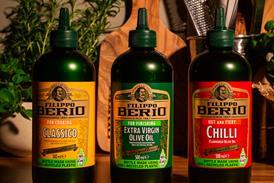



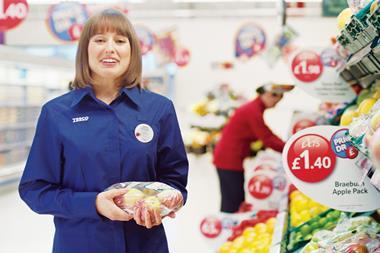

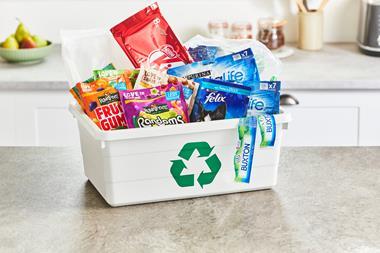
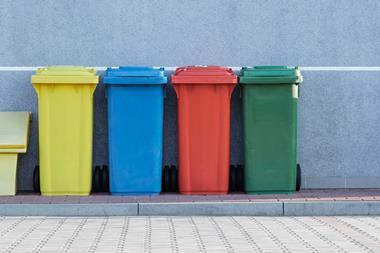
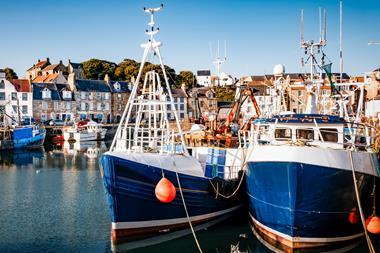


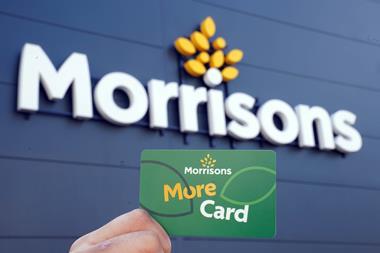
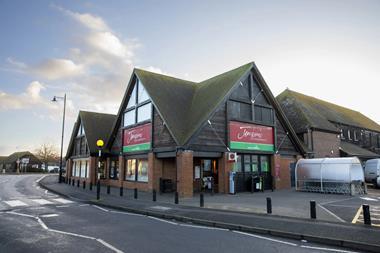
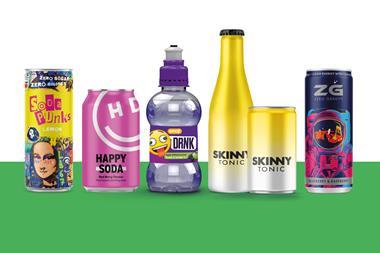
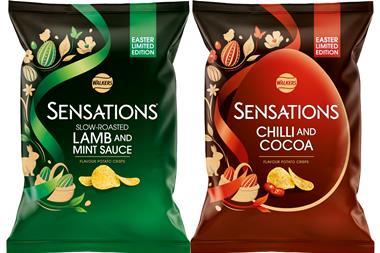
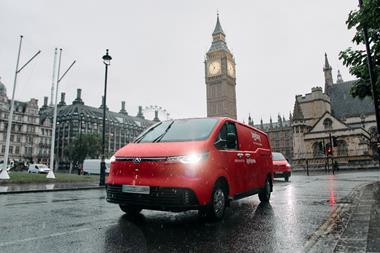
No comments yet